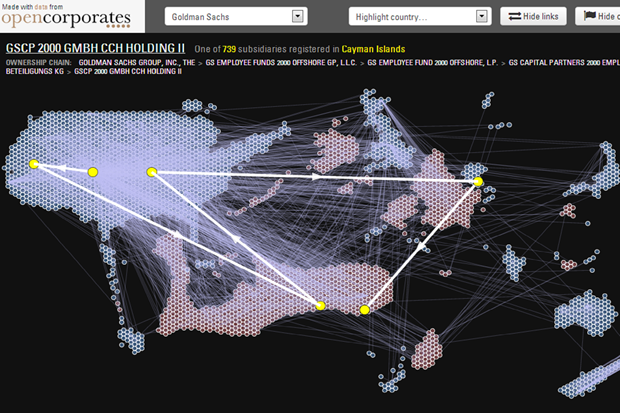The Global Impact of Open Data
United Kingdom's OpenCorporates
Open Data as One Small Part of the Picture
by Becky Hogge
Reference
1 van de Does de Willebois, E., Halter, E., Harrison, R., Park, J., & Sharman, J. (2011). The Puppet Masters: How the Corrupt Use Legal Structures to Hide Stolen Assets and What to do about it. Retrieved from World Bank : https://star.worldbank.org/star/sites/star/files/puppetmastersv1.pdf
2 OECD. (2001). Behind the Corporate Veil: Using Corporate Entities for Illicit Purposes. Retrieved from http://www.oecd.org/daf/ca/behindthecorporateveilusingcorporateentitiesforillicitpurposes.htm
3 OECD. (2001). Behind the Corporate Veil: Using Corporate Entities for Illicit Purposes. Retrieved from http://www.oecd.org/daf/ca/behindthecorporateveilusingcorporateentitiesforillicitpurposes.htm
4 ODI. (n.d.). Case study: OpenCorporates. Retrieved September 30, 2015, from ODI: https://theodi.org/case-studies/opencorporates-case-study
5 Cabinet Office. (2013, January 24). Prime Minister David Cameron’s speech to the World Economic Forum in Davos. Retrieved from https://www.gov.uk/government/speeches/prime-minister-david-camerons-speech-to-the-world-economic-forum-in-davos
6 Interview, Robert Palmer, Head of Banks and Corruption campaign, Global Witness.
7 Confidential source, Cabinet Office
8 Confidential source, Cabinet Office
9 Interview, Robert Palmer, Head of Banks and Corruption campaign, Global Witness.
10 G8. (2013). G8 Action Plan Principles to prevent the misuse of companies and legal arrangements. Retrieved from gov.uk: https://www.gov.uk/government/uploads/system/uploads/attachment_data/file/207532/G8-Action-Plan-principles-to-prevent-the-misuse-of-companies-and-legal-arrangements.pdf
11 The author notes that the G8 Open Data Charter, which commits G8 governments to an “open by default” policy, was also launched at Lough Erne. The campaign for beneficial ownership transparency is treated as separate from the campaign for the open data charter for the purposes of this report.
12 Cameron, D. (2013, June 19). HC Deb, 19 June 2013, c913. Retrieved from TheyWorkForYou.com: http://www.theyworkforyou.com/debates/?id=2013-06-19a.893.0#g913.4 (my emphasis)
13 For details of the datasets used, see Taggart, C. (2013, July 11). Announcing open corporate network data: not just good, but better. Retrieved from OpenCorporates: http://blog.opencorporates.com/2013/07/11/open-corporate-network-data-not-just-good-but-better/
Chris Taggart gives more detail of these datasets and the work that went into obtaining them: “[They were] the [US Securities and Exchange Commission]’s EDGAR website (specifically the Exhibit 21 subsidiary filings) and the Federal Reserve’s Bank database of Bank Holding Company corporate structures. Both were problematic: in the case of the Exhibit 21 filings, these are more-or-less unstructured filings, of a wide variety of forms and formats; in the Fed data, it meant reengineering data from complex PDFs of hundreds of pages long.” (personal communication)
14 Interview, Chris Taggart, CEO, Open Corporates.
15 For a discussion of the design element of the OpenCorporates visualization, see Kiln. (n.d.). OpenCorporates Maps. Retrieved September 30, 2015, from Kiln: http://www.kiln.it/projects/opencorporates
16 Interview, Robert Palmer, Head of Banks and Corruption campaign, Global Witness.
17 See Meyer, D. (2013, July 12). Want to follow the money? OpenCorporates uses open data to expose corporate structures. Retrieved from GigaOm: https://gigaom.com/2013/07/12/want-to-follow-the-money-opencorporates-uses-open-data-to-expose-corporate-structures/; Solon, O. (2013, July 11). Open data platform reveals complex corporate structures of banks. Retrieved from Wired.co.uk: http://www.wired.co.uk/news/archive/2013-07/11/opencorporates; McKenzie, J. (2013, October 16). Open Corporate Data For Everyone, Everywhere. Retrieved from TechPresident: http://techpresident.com/news/wegov/24436/open-corporate-data-everyone-everywhere; Kastrenakes, J. (2013, July 12). Trace the convoluted worldwide structures that your bank uses to dodge taxes . Retrieved from The Verge: http://www.theverge.com/2013/7/12/4517178/opencorporates-visualizes-convoluted-global-banking-structures; Computer Weekly. (2013, July 11). OpenCorporates makes company data public. Retrieved from Computer Weekly: http://www.computerweekly.com/news/2240187869/OpenCorporates-makes-company-data-public; and Campbell-Dollaghan, K. (2013, July 17). Check Out These Totally Not Shocking Maps of Corporate Tax Avoidance. Retrieved from Gizmodo: http://gizmodo.com/check-out-these-totally-not-shocking-maps-of-corporate-818076424
18 It’s important to note that OpenCorporates was also involved – as were many others in the open data community—in more general campaigning around the UK’s OGP Action Plan during this period. (Martin Tisné, Director of Policy at Omidyar Network, private communication)
19 Interview, Chris Taggart, CEO, Open Corporates.
20 Interview, David McNair, Director (Transparency and Accountability) ONE Campaign; Deputy Director of Policy and Research, Save the Children 2012-2014.
21 Private communication, Robert Palmer, Head of Banks and Corruption campaign, Global Witness.
22 Transparency International. (2014, November 17). Six things to know: new G20 Beneficial Ownership Principles. Retrieved from Transparency International: http://www.transparency.org/news/feature/six_things_to_know_new_g20_beneficial_ownership_principles
23 Interview, Chris Taggart, CEO, Open Corporates.
24 Gray, J., & Davies, T. (2015, May). Fighting Phantom Firms in the UK: From Opening Up Datasets to Reshaping Data Infrastructures? Retrieved from Working Paper for the Open Data Research Symposium, Ottawa, Canada, May 2015: http://papers.ssrn.com/sol3/papers.cfm?abstract_id=2610937
25 Gray, J., & Davies, T. (2015, May). Fighting Phantom Firms in the UK: From Opening Up Datasets to Reshaping Data Infrastructures? Retrieved from Working Paper for the Open Data Research Symposium, Ottawa, Canada, May 2015: http://papers.ssrn.com/sol3/papers.cfm?abstract_id=2610937
26 Gray, J., & Davies, T. (2015, May). Fighting Phantom Firms in the UK: From Opening Up Datasets to Reshaping Data Infrastructures? Retrieved from Working Paper for the Open Data Research Symposium, Ottawa, Canada, May 2015: http://papers.ssrn.com/sol3/papers.cfm?abstract_id=2610937



